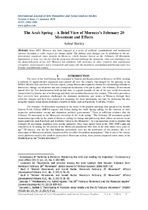| dc.contributor.author | Ashraf, Booley | |
| dc.date.accessioned | 2021-06-18T09:20:44Z | |
| dc.date.available | 2021-06-18T09:20:44Z | |
| dc.date.issued | 2020 | |
| dc.identifier.citation | Ashraf, B. (2020). The Arab Spring – A brief view of Morocco’s February 20 movement and effects. International Journal of Arts Humanities and Social Sciences Studies, 6(1).9-13 | en_US |
| dc.identifier.issn | 2582-1601 | |
| dc.identifier.uri | http://hdl.handle.net/10566/6298 | |
| dc.description.abstract | : Since 2011, Morocco has been engaged in a series of political, constitutional and institutional
reforms, including a wider respect for human rights. The debates and changes can be attributed to the unprecedented organised mass protests in Morocco, which became known as the February 20 Movement.
Importantly, to note, was the fact that the protestors did not challenge the monarchy, what was challenged was
the democratization of not only Morocco but solidarity with protestors in other countries that experienced
corruption, social injustice and a serious lack and respect for the most basic and fundamental human rights in a
broader constitutional context | en_US |
| dc.language.iso | en | en_US |
| dc.publisher | International Journal of Arts Humanities and Social Sciences Studies | en_US |
| dc.subject | Morocco | en_US |
| dc.subject | Human rights | en_US |
| dc.subject | Arab spring | en_US |
| dc.subject | Democratization | en_US |
| dc.title | The Arab Spring – A brief view of Morocco’s February 20 movement and effects | en_US |
| dc.type | Article | en_US |

